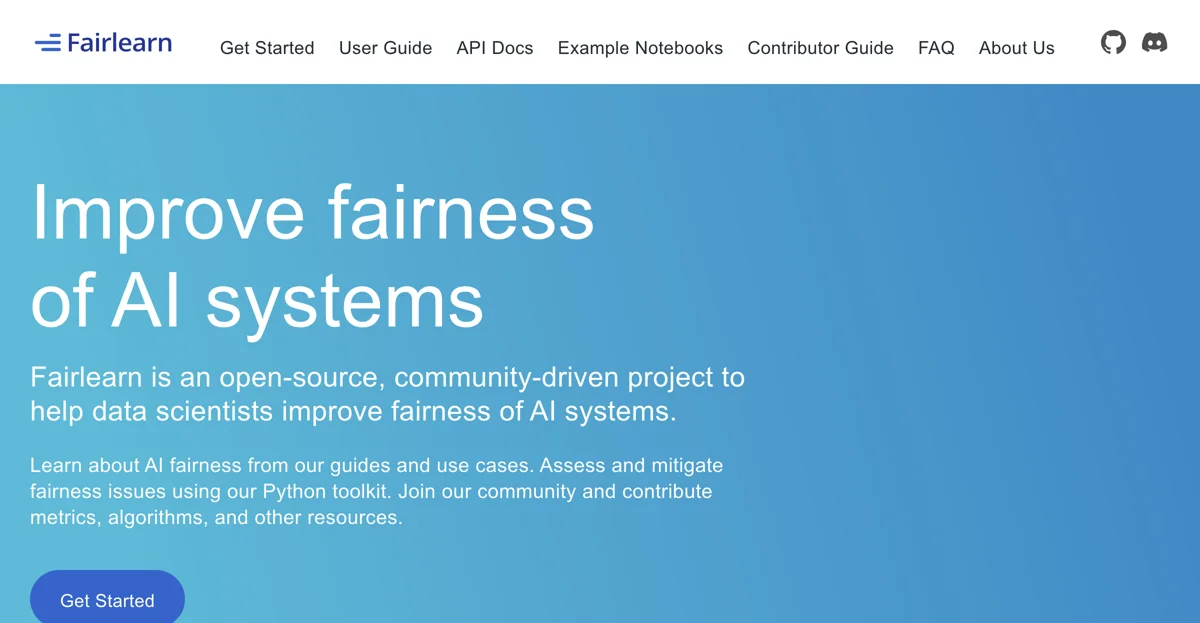Fairlearn is an open-source, community-driven project aimed at helping data scientists enhance the fairness of AI systems. It offers valuable resources such as user guides, example notebooks, and contributor guidelines. The importance of considering AI fairness as a sociotechnical issue is emphasized, as there are numerous complex sources of unfairness and various mitigation processes. For instance, in the context of credit-card default models, Fairlearn can be used to assess and mitigate fairness issues. Users can get started by installing the Fairlearn package and referring to the provided resources. The Fairlearn community is diverse, consisting of open source contributors, data science practitioners, and responsible AI enthusiasts. They can contribute in various ways, including providing case studies, documentation, or code. The project is maintained by a group of dedicated individuals, and users are encouraged to join the effort to evolve the toolkit together.

Fairlearn
Fairlearn helps improve AI fairness with metrics and algorithms. Join the community to contribute.

Top Alternatives to Fairlearn
Boba
Boba is an AI-powered ideation tool that assists with research and strategy
Wiseone
Wiseone is an AI-powered tool that boosts web search and reading productivity
Project Knowledge Exploration
Project Knowledge Exploration is an AI-powered research platform that offers in-depth exploration
Runway
Runway is an AI-powered creativity tool for various media
Notably
Notably is an AI-powered research platform that boosts efficiency
PaperBrain
PaperBrain is an AI-powered research tool that simplifies access
Unriddle
Unriddle is an AI-powered research tool that saves time and simplifies tasks
Journey AI
Journey AI converts customer research into actionable journey maps
genei
genei is an AI-powered research tool that boosts productivity
Replio
Replio is an AI-powered research platform that streamlines interviews and analytics
Layer
Layer is an AI-powered research tool that saves time
Iris.ai RSpace™
Iris.ai RSpace™ is an AI-powered workspace for smarter research
Fairgen
Fairgen is an AI-powered research tool that offers granular insights
Towards Data Science
Towards Data Science offers diverse AI-related content and insights
NewsDeck
NewsDeck is an AI-powered newsreader that helps users discover, filter, and analyze thousands of articles daily.
Locus
Locus is an AI-powered smart search tool that enhances productivity by quickly finding relevant information on any web page using natural language.
Encord
Encord is an AI-powered data development platform that accelerates data curation and labeling workflows for computer vision and multimodal AI teams.
Seeker
Seeker is a secure, retrieval-augmented generation AI chat platform that provides trustworthy insights from large data sets.
AIModels.fyi
AIModels.fyi is an AI-powered platform that curates and summarizes the latest AI research papers, models, and tools, helping users stay informed about significant AI breakthroughs.
22Analytics
22Analytics is an AI-powered market research platform that helps users validate ideas and analyze competitors efficiently.
Grably
Grably offers instant access to highly-specific, labeled datasets for AI training, enhancing model accuracy with diverse real-world data.